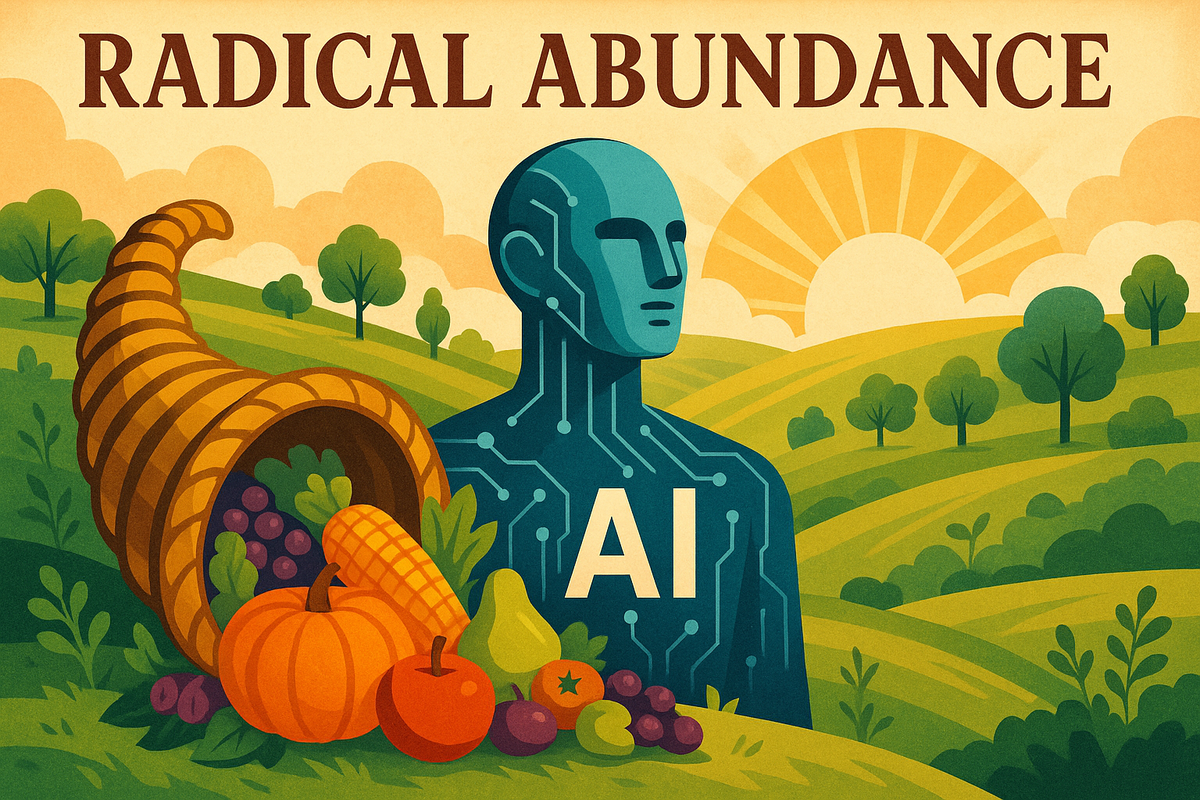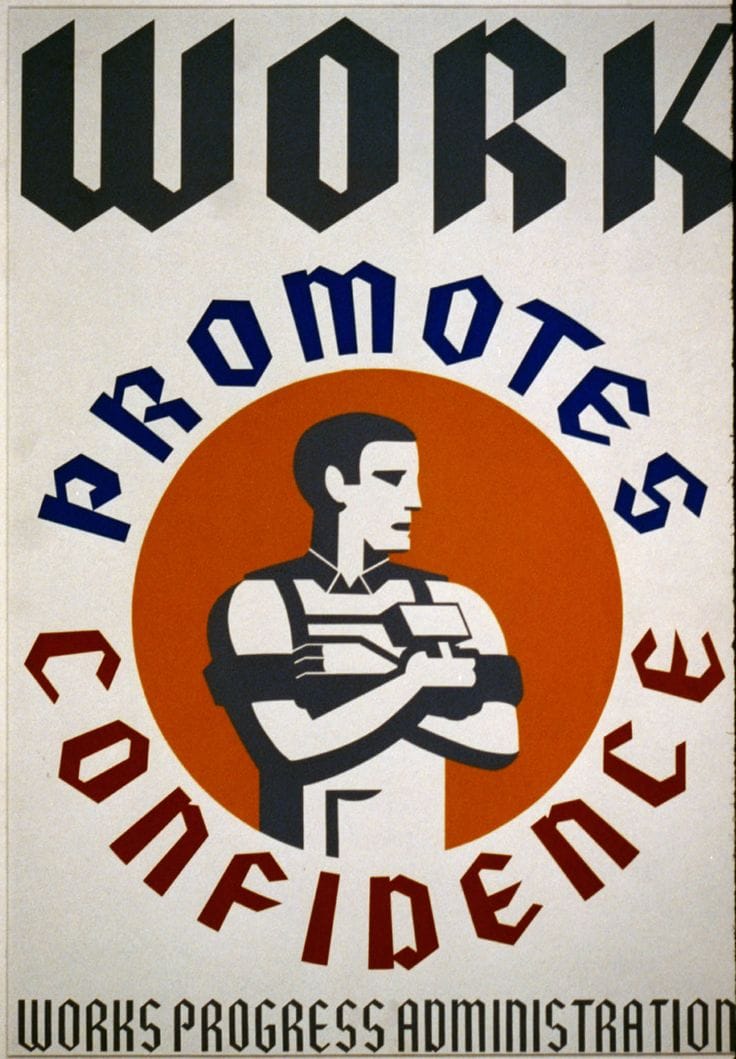Radical Abundance

This is the second in a three-part series focusing on the radical ideas that are surfacing among us: radical transparency, radical abundance, and radical reporting.
Abundance is having a moment – from the current chart-topping bestseller by Ezra Klein and Derek Thompson (Abundance, which I haven’t yet read) to a philosophy born of Silicon Valley that was recently introduced to me by a podcast.
That podcast, Hard Fork, featured an interview with Google DeepMind CEO Demis Hassabis on the future of AI. Hassabis talked insightfully and confidently about AI’s role in the future…until he was asked about AI-powered job loss. (59:13 in the episode if you care to check.)
The change wasn’t drastic, but you could tell he was speaking on slightly shifting ground, kind of like a job interview where you’re asked a question you don’t know the answer to but decide to birth a best-guest response anyway.
This is where Hassabis brings up the idea of radical abundance (1:04:10) and the notion it could lead to a cornucopia of resources with more than enough to go around for everyone. Everyone. In essence, easy street for humanity, or as he said – and I’m paraphrasing – radical abundance could allow people to get back to nature with maximum human flourishing.
Radical Abundance – A Quick Primer
If you’re new to the idea of radical abundance, here’s a quick primer: It refers to a hypothetical future state where generative AI systems could dramatically reduce or eliminate scarcity for most goods and services, fundamentally transforming economics and society. Proponents posit AI could become so powerful at solving problems, optimizing processes, and automating production that the cost of producing almost everything drops toward … wait for it … zero.
As in zippo, nada, nothing.
In the interview, Hassabis acknowledges there would be a transition period to achieve this state and the political question of how the spoils are divvied up.
He, like other AI evangelists, perpetuates a trope that while some jobs will be lost, new and more valuable jobs will be created, as has been the case in prior technological revolutions.
Radical abundance is a theory – theoretical – to these men (yes, mostly men), based upon a rear-view mirror that moves far slower than the side-view mirror of AI’s galloping advance.
Put aside the future state where your electricity, transportation, and even your Oreo’s are free, it’s this transition period to wherever we’re headed that I find tricky.
I don’t think our world will be able to keep up with the pace of change this provokes. I believe the speed at which AI is advancing, whoosh! – coupled with the innate desire of CEOs to save a few pennies per share for this quarter’s earnings call – will, yes, rattle our economic cage and perhaps more importantly, shake our society in ways that are new and profoundly more complex and challenging.
It’s Already Happening
We’re seeing AI beginning to hollow out the market for entry-level jobs. A senior executive at LinkedIn – which makes a business out of connecting job seekers with employment – wrote about this. Anthropic AI CEO and Founder Dario Amodei recently told Axios that within one to five years 50 percent of all entry-level, white-collar jobs could be replaced.
And the New York Times Business Section devoted a lengthy article to it.
So, on the economic side of things, it’s happening, and it’s happening fast.
Neither the corporate sector nor the government can throw a switch to offset the volume of job losses this is likely to occasion.
There are ideas being floated around for how to accommodate this seismic change, from Universal Basic Income (UBI) whereby everyone is guaranteed a minimum level of income to a Post-Scarcity Commons where basic goods, with a cost of zero, are available for free.
There’s also the question of AI ownership and how to transform the bounty created by private companies into public benefit. Perhaps a “golden share,” not unlike what Trump has proposed for the acquisition of US Steel by Nippon Steel, that enables profit and direction to be guided by the government? I’m sure the Silicon Valley crowd would love that.
Where There's Work, There's Meaning
So, there’s money, always money. But I think a silent and larger tsunami approaches, and it’s a concussive wave that could flatten our psyches as we look to create meaning in our lives.
First off, I’ve been working since 1985, so I get it: Monday mornings might not be your favorite thing, work can indeed suck at times, but it also happens to be where most of us derive significant meaning in our lives. It’s in the workplace where we often discover that we matter, build self-esteem, and add value to the world around us. Here's a good demonstration pointed out to me by Godspeed reader Paul Dunn in an article from the Harvard Business Review.
And when our work goes away, how do we replace the sense of purpose and all that it provides?

We might restore it with large-scale, physical labor programs, something like the Works Progress Administration and Civilian Conservation Corps of the Great Depression, putting people back to work mending the environmental harms we’ve wrought upon our planet.
We might all become gamers. Perpetual tourists. Or plumbers – at least until the robots take over the household pipes.
Meaning. That’s the big unanswered AI question in my mind. Not the “economic thing,” nor what happens with deep fakes and digital fraud, power grids and nuclear launch codes, and all the many potential problems presented by bad actors. It’s something as simple as the ancient saying: “Idle hands are the devil’s workshop.”
Yes, like every technology, AI brings pluses and minuses, light and dark. The question is how do we handle the dark if it arrives before the light?
And as for the political question of dividing up the abundant resources? Based upon thousands of years of history and human nature – good luck with that.
Radical abundance feels to me like it’s been reverse engineered into a solution and while I find it amusing this idea is espoused by men who already live in a state of abundance, at a place where much of the world goes without, it’s a necessary discussion by the rest of us, right now.
What do you think? What about AI gives you pause, or hope? And would it be easy, or challenging, for you to find meaning in your life without work?
Godspeed, friends.
Russ
💬 Think About It
"Not that we have But that we enjoy, constitutes our abundance." Epicurus
💥 Quick Hits
• Transparent lobbying – Here's a framework from B Lab to help you shape public policy responsibly and transparently.
• Can we make AI work for us? – Tune in and find out on the Forces for Good podcast.
• Are we our own worst enemies? – Ecocide. Now there's a hideous word. And nowhere is it on display quite like the war in Ukraine.
Find the Most Meaningful Work of Your Career
Our partner One Work has you covered with opportunities that go beyond a paycheck, a cubicle, or a weekly team Zoom call. You'll find purposeful jobs like those below at the One Work job board.
• Gates Foundation - It's a new program for a new you – improve outcomes in lower-income companies for the foundation's new Women's Health Innovations program. Senior Program Assistant, Seattle, WA.
• Founders Pledge - Help bridge the gap between entrepreneurs and the charities making the most difference in the world. Senior Program Manager, REMOTE.
• Food for Climate League - If you're ready for the big leagues, this one's for you, because it's time to make climate-smart eating the norm. Marketing and Communications Associate, REMOTE.
Need help in some way? Have a story idea, question, or request? Perhaps a social entrepreneur we should interview? Let us know – We're here to help. Just reply to this email with whatever you've got. We'll see you next week.
